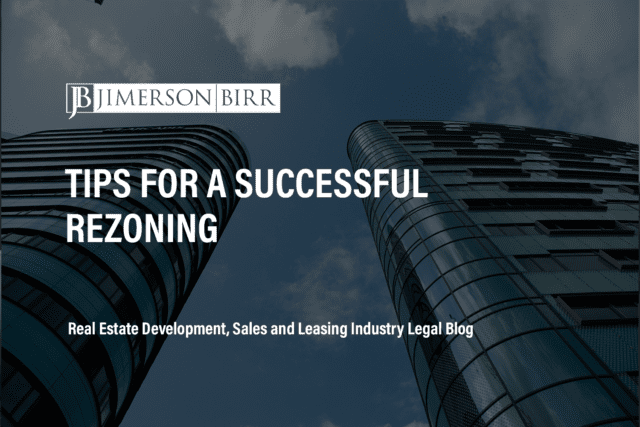What are restrictive covenants?
Restrictive covenants are clauses or conditions typically included in legal documents such as deeds, leases, or homeowners’ association agreements. These provisions impose certain restrictions on how the property can be used or developed. Here are some common examples:
- Covenant, Conditions, and Restrictions (CC&R): These are commonly found in neighborhoods with homeowners’ associations (HOAs). CC&Rs can include rules about property maintenance, architectural guidelines, noise restrictions, and even limitations on the types of pets allowed.
- Easements: An easement grants someone else the right to use a portion of the property for a specific purpose, such as allowing access to a neighboring property or permitting utilities to run through the land.
- Deed Restrictions: These are contractual agreements that limit the use or development of the property. Deed restrictions can cover many issues, including building size, signage, landscaping, etc.
- Land Use Agreements: Property owners may sometimes enter into agreements with neighboring landowners or governmental entities to limit specific uses of their property, such as agreeing not to develop the land in a particular way or to maintain certain features like green space.
These restrictive covenants or provisions serve various purposes, including protecting property values, preserving the character of a neighborhood, and promoting public health and safety. Violating these restrictions can result in legal consequences, such as fines, lawsuits, or injunctions.
Need help with a matter related to effective drafting and reviewing for restrictive covenants or provisions for limiting or prohibiting the use of property? Schedule your consultation today with a top land use and zoning attorney.
In Florida, which laws and regulations relate to restrictive covenants?
In Florida, the relevant laws and regulations include:
- Florida Statutes, Chapter 720 – Homeowners’ Associations: This chapter governs the operation and management of homeowners’ associations, which often include restrictive covenants that limit or prohibit the use of property within the community.
- Florida Statutes, Chapter 712 – Marketable Record Title Act: This chapter provides a mechanism for extinguishing old restrictions and covenants that may have been placed on a property to make title to the property marketable. Reviewing old covenants can be effective for eliminating past limits that have been put on property.
- Florida Statutes, Chapter 718 – Condominiums: This chapter governs the operation and management of condominium associations, which often include restrictive covenants that limit or prohibit the use of property within the condominium.
What are common issues regarding the drafting of restrictive covenants or provisions for limiting or prohibiting the use of property that lead to litigation?
There are several common issues regarding the drafting of restrictive covenants or provisions for limiting or prohibiting the use of property that can lead to litigation. These include:
- Ambiguity or Vagueness: If the language of the restrictive covenant or provision is unclear or ambiguous, it can lead to disputes between property owners and potential litigation.
- Overly Restrictive Language: If the language of the restrictive covenant or provision is too restrictive or prohibits reasonable uses of the property, it can lead to challenges and litigation.
- Failure to Update: If the language of the restrictive covenant or provision does not consider changes in the property or community, it may no longer serve its intended purpose and could lead to disputes and litigation.
- Violations of Public Policy: If the language of the restrictive covenant or provision violates public policy, it may be unenforceable and lead to litigation.
- Failure to Comply with Legal Requirements: If the language of the restrictive covenant or provision does not comply with legal requirements, such as fair housing laws, it may be unenforceable and lead to litigation.
- Unreasonable Restrictions: If the restrictive covenant or provision imposes unreasonable restrictions on the use of the property, it may be challenged and lead to litigation.
When a set of facts is appropriate to require effective drafting and reviewing for restrictive covenants or provisions for limiting or prohibiting the use of property, there are many paths one may take. We are value-based attorneys at Jimerson Birr, which means we look at each action with our clients from the point of view of costs and benefits while reducing liability. Then, based on our client’s objectives, we chart a path to seek appropriate remedies.
To determine whether your unique situation may necessitate litigation, please contact our office to set up your initial consultation.
What are effective measures to minimize the risk of litigation during the drafting and reviewing of restrictive covenants or provisions for limiting or prohibiting the use of property?
Several effective measures can be taken to minimize the risk of litigation. These include:
- Clarity in Drafting: Ensure that the language of the restrictive covenant or provision is clear, concise, and easily understandable to minimize any potential confusion or ambiguity that could lead to litigation.
- Compliance with Legal Requirements: Ensure that the language of the restrictive covenant or provision complies with all applicable legal requirements, such as fair housing laws, to avoid challenges and potential litigation.
- Updating: Regularly review and update the language of the restrictive covenant or provision to ensure that it continues to serve its intended purpose and reflects any changes in the property or community, which could help avoid disputes and potential litigation.
- Reasonable Restrictions: Ensure that the restrictions imposed by the restrictive covenant or provision are reasonable and do not unreasonably restrict the use of the property, which could help avoid challenges and potential litigation.
Frequently Asked Questions
Who is responsible for enforcing a restrictive covenant?
In most cases, property owners are responsible for enforcing restrictive covenants. However, in some cases, homeowners’ associations or other organizations may also be involved in enforcement.
What should be included in a restrictive covenant?
A restrictive covenant should be clear, specific, and unambiguous. It should include the names of the parties involved, the property affected, the restrictions or limitations imposed, and the consequences of any breach.
Have more questions about a situation related to the drafting and reviewing restrictive covenants or provisions for limiting or prohibiting the use of property?
Crucially, this overview of effective drafting and reviewing for restrictive covenants or provisions for limiting or prohibiting the use of property does not begin to cover all the laws implicated by this issue or the factors that may compel the application of such laws. Every case is unique, and the laws can produce different outcomes depending on the individual circumstances.
Jimerson Birr attorneys guide our clients to help make informed decisions while ensuring their rights are respected and protected. Our lawyers are highly trained and experienced in the nuances of the law, so they can accurately interpret statutes and case law and holistically prepare individuals or companies for their legal endeavors. Through this intense personal investment and advocacy, our lawyers will help resolve the issue’s complicated legal problems efficiently and effectively.
Having a Jimerson Birr attorney on your side means securing a team of seasoned, multi-dimensional, cross-functional legal professionals. Whether it is a transaction, an operational issue, a regulatory challenge, or a contested legal predicament that may require court intervention, we remain a tireless advocate every step of the way. Being a value-added law firm means putting the client at the forefront of everything we do. We use our experience to help our clients navigate even the most complex problems and come out the other side triumphant.
If you want to understand your case, the merits of your claim or defense, potential monetary awards, or the amount of exposure you face, you should speak with a qualified Jimerson Birr lawyer. Our experienced team of attorneys is here to help. Call Jimerson Birr at (904) 389-0050 or use the contact form to set up a consultation.
Here are some blogs written by JB attorneys that provide more information about effective drafting and reviewing for restrictive covenants or provisions for limiting or prohibiting the use of property:


We live by our 7 Superior Service Commitments
- Conferring Client-Defined Value
- Efficient and Cost-Effective
- Accessibility
- Delivering an Experience While Delivering Results
- Meaningful and Enduring Partnership
- Exceptional Communication Based Upon Listening
- Accountability to Goals










